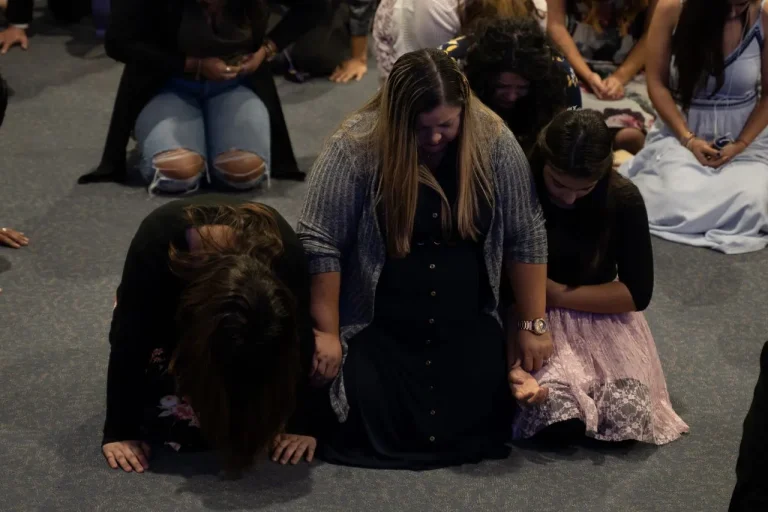What Does The Bible Say About Fighting Back?
When facing conflict or aggression from others, a common question arises: does the Bible permit fighting back and self-defense? This issue has been debated for centuries among Christians seeking biblical wisdom on how to respond.
If you’re short on time, here’s a quick answer: the Bible does not strictly prohibit fighting back or self-defense in all situations. However, it strongly emphasizes peaceful alternatives, forgiveness, and placing trust in God’s justice.
In this comprehensive article, we will examine key biblical passages about peacemaking, nonviolence, justice, and defense from harm. We will consider perspectives both for and against forms of fighting back or retaliation.
We will also highlight principles from Jesus and other biblical figures on how believers can apply timeless scriptural truths to modern ethical dilemmas involving self-defense or the defense of others.
Core Biblical Principles on Peace and Nonviolence
Love Your Enemies
One of the most well-known teachings of Jesus is to “love your enemies and pray for those who persecute you” (Matthew 5:44). This profoundly countercultural command goes against our natural inclination to retaliate or seek revenge against those who have harmed us.
However, Jesus makes it clear that enemies should be shown love and compassion, not repaid with violence or retaliation. Practicing enemy-love develops godly character and can help diffuse conflict and foster reconciliation (GotQuestions.org).
Turn the Other Cheek
In his famous Sermon on the Mount, Jesus expanded on the Old Testament command of “an eye for an eye” by challenging his followers not to resist an evildoer. “If anyone slaps you on the right cheek, turn to them the other cheek also” (Matthew 5:39).
Rather than meeting violence with more violence, Jesus advocated creative nonviolent resistance. This could include things like speaking the truth in love, appealing to the conscience of oppressors, taking direct action through protests or boycotts, etc.
Turning the other cheek displays confidence in God’s justice and tests the attacker’s humanity (Sojourners).
The Fruits of Peacemaking
Jesus pronounced blessings on the peacemakers, for “they will be called children of God” (Matthew 5:9). Rather than sowing seeds of discord, hostility, and strife, Jesus’ true followers seek to be agents of peace, forgiveness, and reconciliation wherever possible.
Research shows that adopting an attitude of active goodwill toward others has measurable benefits for physical and mental health (Greater Good Magazine). By embodying the peace of Christ, his followers display God’s reconciling love to a conflict-weary world. What an amazing calling!
Key New Testament Passages on Non-Retaliation and Forgiveness
Romans 12:14 is a key New Testament verse on blessing those who persecute you: “Bless those who persecute you; bless and do not curse.” As the verse teaches, Jesus calls believers to not retaliate against evil but to respond with love and blessings instead.
This echoes His teachings in Matthew 5:44, “But I tell you, love your enemies and pray for those who persecute you.”
Living out these radical commands of the Lord Jesus is only possible by His grace and the power of the indwelling Holy Spirit (Romans 8:26-27). As His followers yield to the Spirit inside them, He begins to produce the supernatural fruit of “love, joy, peace, forbearance, kindness, goodness, faithfulness, gentleness and self-control” (Galatians 5:22-23).
1 Peter 3: Respond to Suffering with Blessing
First Peter 3:9 gives another strong New Testament command to not repay evil for evil but to respond to hurt with blessing: “Do not repay evil with evil or insult with insult. On the contrary, repay evil with blessing, because to this you were called so that you may inherit a blessing.”
In the same chapter, Peter points followers of Jesus back to His sinless example in the midst of unjust suffering (1 Peter 3:18). When reviled and persecuted, Jesus didn’t retaliate but entrusted Himself to the One who judges justly (1 Peter 2:23).
His sheep are called to follow in His steps of enduring grief while doing good (1 Peter 2:20-21).
1 Corinthians 6: Why Not Take Your Brother to Court?
First Corinthians 6:7-8 provides insight into why believers should not retaliate against other Christians who have wronged them but rather forgive: “The very fact that you have lawsuits among you means you have been completely defeated already. Why not rather be wronged? Why not rather be cheated?”
As this passage indicates, dragging a fellow believer into court is already a moral and spiritual defeat. How much better to absorb the wrong, not demand personal rights, and extend grace. This posture of humility keeps unity in the body of Christ (Ephesians 4:3).
It also models the gracious forgiveness that every Christian enjoys from God (Colossians 3:13).
Old Testament Allowances for Protection of Innocents
Esther: Courage to Defend God’s People
In the book of Esther, Queen Esther showed great courage when she risked her life to go before King Xerxes to save the Jews from the evil plot of Haman (Esther 7:3-4). As a result, the king allowed the Jews to defend themselves against attacks and they destroyed their enemies (Esther 8-9).
This demonstrates that acting courageously to protect the innocent, even at personal risk, is permitted and admirable.
Nehemiah: Guarding Against External Threats
As Nehemiah led the rebuilding of Jerusalem’s walls, he organized guards to protect the workers day and night (Nehemiah 4:9). When outside forces plotted to attack, Nehemiah took measures to guard the people and finish the walls (Nehemiah 4:13-23).
This shows that vigilance and prudent protective actions in the face of external threats are warranted for community safety.
Proverbs: Protection of the Vulnerable
Several Proverbs promote defending vulnerable groups from violence or injustice. For example, Proverbs 31:8-9 urges, “Speak up for those who cannot speak for themselves…defend the rights of the poor and needy.
“ This advocates intervening on behalf of those who cannot defend themselves from harm or exploitation.
Additionally, Proverbs teaches the general concept to “rescue those being led away to death” and “hold back those staggering toward slaughter” (Proverbs 24:11). While open to interpretation, this principle could condone physical intervention if truly needed to save innocents from significant harm.
Perspectives On When Self-Defense May Be Justified
Self-Defense to Prevent Imminent Harm
The Bible affirms the right to defend oneself against imminent violence. In Exodus 22:2-3, the Law of Moses states that killing a thief in self-defense when struck is not considered murder. Jesus told His disciples in Luke 22:36 to carry swords for protection, though not to aggress others.
Paul wrote in Acts 22:22-29 that he legally defended his rights as a Roman citizen when seized unlawfully. Self-defense against imminent harm seems to be Biblically justified.
However, Christians are also called to turn the other cheek (Matthew 5:39), love enemies (Matthew 5:44), and not repay evil with evil (Romans 12:17). Defending oneself should be a last resort, with nonviolent alternatives strongly preferred when possible.
The response must not exceed what is proportional to the threat.
Defense of Others, Especially the Weak
Christians are expected to defend those who cannot defend themselves. Psalm 82:3-4 calls on us to “defend the weak and the fatherless; maintain the rights of the poor and oppressed. Rescue the weak and needy.” This often requires fighting against evil forces oppressing others.
Esther risked her life to save her people from genocide (Esther 4:13-16). Jesus applauded the Good Samaritan for protecting a victim of violence (Luke 10:25-37). Christians are exhorted to “rescue the weak and needy; deliver them from the hand of the wicked” (Psalm 82:4).
Sitting passively by when defenseless people are harmed is not the Biblical model.
Proportionality in the Response
While defending oneself or others is permitted in Scripture, the means must be proportional to the threat. Exodus 21:22-25 established the “eye for eye” standard of proportional justice. Force exceeding what is needed to stop the threat becomes ethically questionable.
Jesus rebuked His disciples for suggesting calling down fire from heaven to destroy those rejecting Him (Luke 9:54-55). Paul chastised fellow Christians for lawsuits against each other, advocating accepting wrongs instead (1 Corinthians 6:7).
There is a meaningful difference between appropriate defense and vindictive retaliation.
Christians should thoughtfully examine all nonviolent alternatives before resorting to force. If force is unavoidable, it must not exceed containing the threat. We are to overcome evil with good (Romans 12:21), not create more harm than necessary while defending ourselves or others.
Dependence on God Instead of Vengeance
Vengeance Belongs to the Lord
The Bible clearly states that vengeance belongs to God, not humans (Deuteronomy 32:35, Romans 12:19). As Christians, we are called to forgive others and leave justice and punishment to the Lord. This can be challenging when we face persecution or wrongdoing, but God promises to ultimately avenge all wrongs in His perfect timing.
Rather than plotting revenge, Christians can pray for God’s justice and deliverance from oppressors. We can trust that He sees all things and will make right all injustices in His time. Though it may be difficult, resisting the urge for personal vengeance is an act of faith in God’s sovereignty and justice.
Praying for God’s Deliverance and Justice
When facing persecution, Christians can follow biblical examples of praying to God for deliverance and justice (Psalm 7:6, Psalm 35:1). David repeatedly brought his complaints and appeals for justice before the Lord rather than taking matters into his own hands.
We too can cry out to God in prayer, asking Him to be a refuge and strong tower against those who wrong us (Psalm 61:3). As we read in Psalm 35:23, we can say, “Awake, and rise to my defense! Contend for me, my God and Lord.” This honors God’s authority and activates His divine intervention.
Nonviolent Resistance Movements
While personal vengeance is forbidden, Christians have at times participated in nonviolent resistance against injustice. Following Christ’s example of peacemaking, leaders like Martin Luther King Jr. spearheaded movements that confronted oppression through civil disobedience, boycotts, marches and other forms of nonviolent activism grounded in faith.
These efforts called on governing authorities to enact just laws through moral suasion rather than force. By refusing to retaliate against violence with more violence, nonviolent campaigns maintained integrity and helped transform society.
As Christians, we can thoughtfully participate in nonviolent activism today. Whether addressing abortion, poverty, racism or other social ills, we aim not to get even but to overcome evil with good (Romans 12:21). This honors Christ’s model of redemptive justice.
Conclusion
In reviewing diverse biblical texts about responses to wrongdoing, we see a nuanced perspective emerge. While scripture celebrates peacemaking and emphasizes creative nonviolent alternatives, it allows protecting the innocent from harm in extreme cases.
Overall the Bible condemns vengeance and calls us to love enemies, forgive persecutors, and overcome evil with good. Yet defense of life may be permitted when all other alternatives fail. Wise application of these principles relies on guidance from God’s Spirit.








